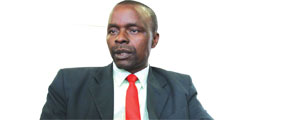
THE term of office for councillors comes to an end on June 29 and Harare, like any other city, is set to go for elections to elect a new leadership.
Harare councillor Warship Dumba, who doubles as the MDC-T provincial secretary for local government and president of the Elected Councillors Association of Zimbabwe (ECAZ) has expressed interest in contesting for the mayoral post.
NewsDay Reporter Moses Matenga (ND) spoke to Dumba (WD) about the challenges the city faces and what he hopes to achieve should he be elected into office.
Below are excerpts of the interview:
ND: Councillor, you successfully presented your CV to contest primary elections to represent MDC-T in the mayoral election, what do you have to offer for the citizens? WD: I am one of the candidates fighting to represent the MDC-T. We will go for primary elections and if I win, then I am prepared to serve and serve well, but if I lose I support whoever is elected to represent the party to make sure the party wins.
ND: If you get the chance to pass through all the stages and become the next Harare Mayor, what are your priorities? WD: The first thing is to make sure people participate in local governance, the problems are with the people and the solutions are with the people. Council assets are being lost in their millions daily and we want to plug leaks, for example financial leaks. We have 24 districts with an average of $35 000 a day in revenue collection, but if you look at it, the money disappears. That’s why we say let’s decentralise authority to districts and have development committees to monitor how funds are getting in and out for people to know what they exactly want and not to rely on Town House.
ND: In what you are saying, you seem convinced that there are lots of leakages in council, how do you think decentralisation will plug the leaks? WD: The problems in Mbare are different from those in Mabvuku and other areas, so there is need for decentralisation so that people in that community utilise their resources to address the challenges in their areas because they know priority. There also should be a development committee in place that will continue to look at critical issues in that district and how funds are used. There is also need to follow up on projects, this council has not been proactive on that. You realise that in the sewage reticulation plant for example, a project that was supposed to be less than $5 million ended up costing $18 million. There is no project monitoring, for example the Airport road project, nobody knows what happened.
ND: You are on record saying management at Town House is pro-Zanu PF and not professional, how do you intend to deal with that issue? WD: Council officials are like square pegs being forced into round holes. Most of them are not qualified for the work they are supposed to be doing, yet a lot of what is supposed to be done is centred on them. We must look for professional people and not political appointees at Town House. The majority are working without contracts and they came to Town House illegally through a commission on political grounds. Most of them are members of a political party. We want Harare to be run professionally.
- Chamisa under fire over US$120K donation
- Mavhunga puts DeMbare into Chibuku quarterfinals
- Pension funds bet on Cabora Bassa oilfields
- Councils defy govt fire tender directive
Keep Reading
ND: Having been part of the outgoing council, what’s your impression of the performance of the team in the last five years? WD: I am not impressed at all. I will put the blame on the parent ministry that didn’t afford councillors enough training. The first project is to teach the councillors on issues relevant to their work, for example, the prevention of corruption. There is need to teach councillors on the Anti-Corruption Act. Basic administration processes for the councillors were not done by the parent ministry. I realised this town can grow, but corruption is rife. If $35 000 a day is properly handled it can work wonders.
ND: Were councillors up to the task? WD: They were all capable, but lacked training. Every person is capable of learning, but they were not given a chance. There was corruption yes, but it was all because of training. There are some things they did well although there was no proper monitoring. You can’t blame council on roads because the Transport ministry took over licensing and took the money.
ND: You chaired the probe team that implicated Local Government minister Ignatius Chombo in land deals. You were arrested after that and you were fired by the same minister from council on fraud charges. Didn’t that dampen your spirit as a city father? WD: In fact I was inspired by that to contest as Mayor. When I was dismissed I had nothing else to do, but to focus on council business and studied a lot on Local Government. I never stopped working in my ward and there are no potholes in my ward because I kept on fighting. I know what people want and have never been given the opportunity to make council do what people want.
ND: You have worked under Mayor Muchadeyi Masunda for the past five years, what’s your view on his leadership and what he has done for the city? WD: I have lots of respect for the mayor, but he is too busy a man to run council. Council needs a person who focuses on the work. The post is too demanding that eight hours is not enough for someone to run council.







